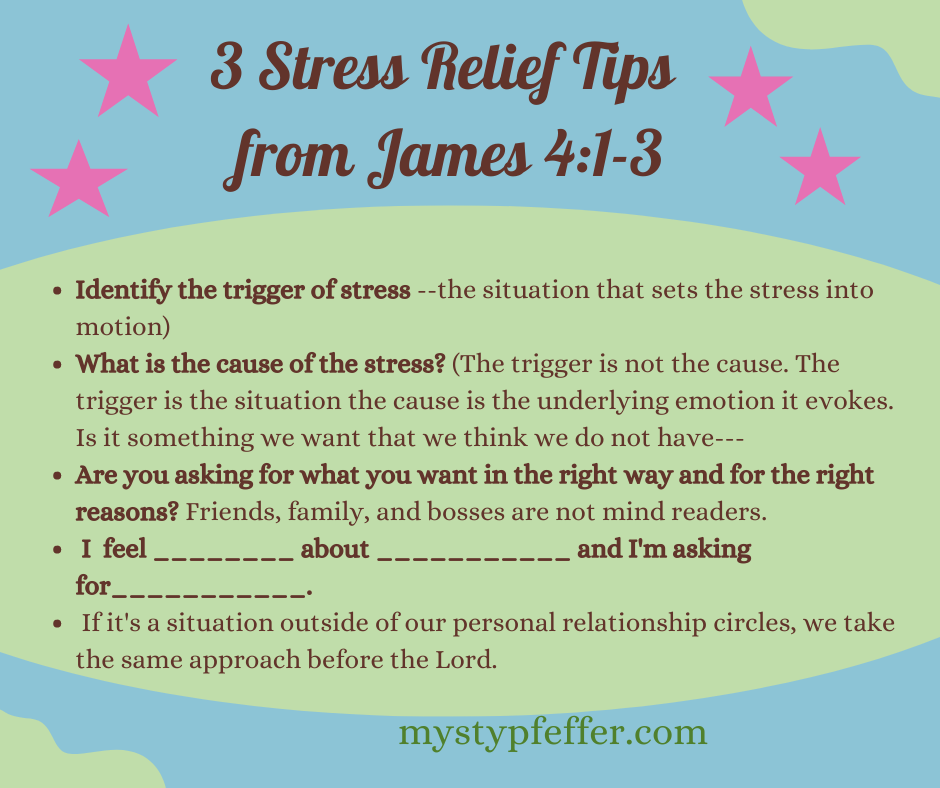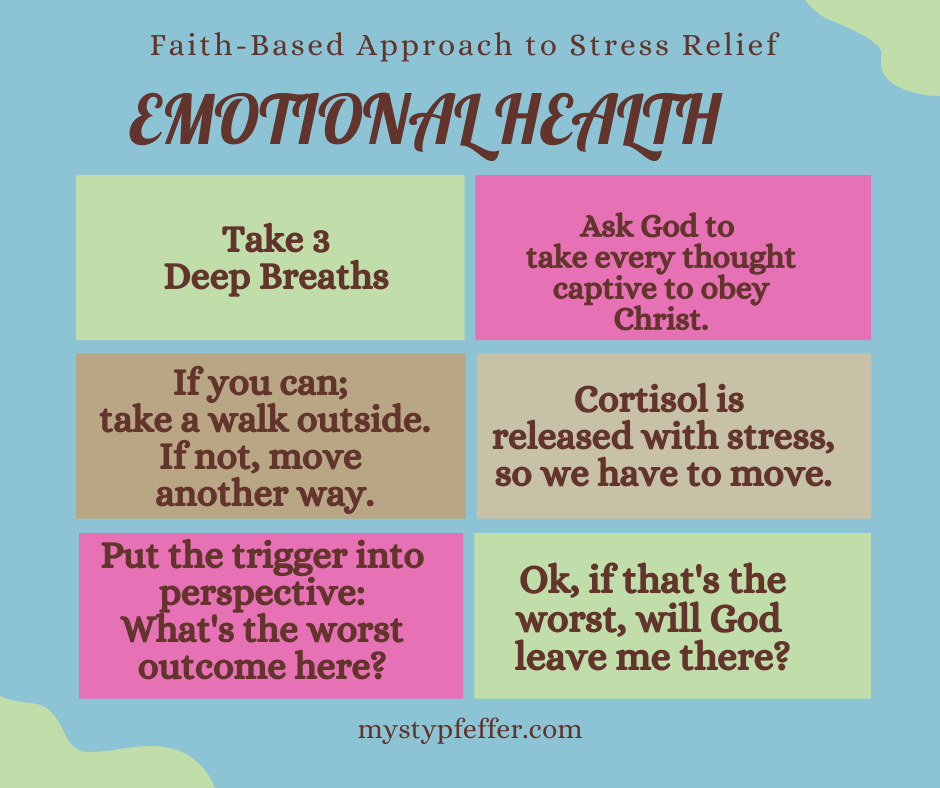A faith-based approach to stress relief shares some characteristics of modern psychology, but also has significant differences. Here are three simple ways to understand the difference and begin our a spiritual action plan to reduce stress.
We will do well to remember there are many approaches for both methods, that are not mentioned here. However, the idea is to look for a starting point.
Starting points make it simple for the average person experiencing daily stressors. Although it’s a good idea to keep in mind, chronic sufferers (not getting relief from stress for six months or more) require a more specialized approach!
Approaches to Stress Relief
The World’s Methods
- Take deep breaths to calm ourselves–this is good! The world teaches us to do this for calming our hearts and minds. It is a very effective technique to implement for stress relief.
- Look inside yourself for strength. We are not denying we each have our own strengths. Resilience, grit, tenacity, lightheartedness, resourcefulness, and sensibleness are all qualities we develop as we age. In a moment of overwhelming emotion this is our go-to. What happens when it fails? Ruminating, self-doubt, and fear take control.
- Medications First. We are not denying there is a time and place for medication. But should it be first-line treatment? Thank God, for good counselors who determine a person’s strengths, assess past traumas and help the person work through those things. They determine a true need for added substances. But oftentimes, natural techniques are placed last.
Faith-Based Methods
- God is breath, so breathing in fresh air gives our brains the much-needed oxygen to think clearly. We can focus, lower our heart rates, and gain control of emotions.
- Look to God for strength. We understand our inner strengths, and put them in the perspective of “Ultimately, I am not in control of what happens here, God is.” So, how can we trust Him, regardless of what happens? Is there a personal relationship between me and God, instead of distant communication?
- Look for the underlying cause. Counseling, working through trauma, evaluating eating patterns, exercise, baseline vitamin deficiencies, past antibiotic use, and determining gut health (and the techniques mentioned above) are first-line ways to help with stress. We can appreciate how James puts it too, see James 4:1-3 below.
What causes quarrels and what causes fights among you? Is it not this, that your passions are at war within you? You desire and do not have, so you murder. You covet and cannot obtain, so you fight and quarrel. You do not have, because you do not ask. You ask and do not receive, because you ask wrongly, to spend it on your passions.
James 4:1-3 ESV – Warning Against Worldliness – Bible Gateway
3 Stress Relief Tips from James 4:1-3
- Identify the trigger of stress (The situation that sets the stress into motion –an argument, pressure to finish a project, a relationship issue, a safety concern, talking to a large group, preparing for an exam, etc.)
- What is the cause of the stress? (The trigger is not the cause. The trigger is the situation; the cause is the underlying emotion it evokes. Is it something we want, we think, we do not have—-Maybe, love from a family member, respect from a boss, children, or others, fear of failure, pressure to perform tasks outside of our comfort zone, fear of harm or danger, lack of confidence.
- Are you asking for what you want in the right way and for the right reasons? Friends, family, and bosses are not mind readers. And in most cases, they are reasonable people who are willing to listen to our concerns! What would it take to state clearly and concisely how we feel about the trigger (situation setting the stress into motion) and the cause. (I feel __________ about ___________ and I’m asking for___________.) If it’s a situation outside of our personal relationship circles, we take the same steps before the Lord.

How the Faith-Based Approach
To Stress Worked for Me
Several years ago, my two girls were attending a large urban college. At the time, I was working in an intensive care unit (ICU) close by. One day I cared for a professor who taught at their school. I asked him if it were true the crime rate is as bad as reports on the news made it out to be. He said, “Oh yes! I’ve been mugged in broad daylight twice, and it happens to people every week.”
This momma’s heart trembled with an intense and sudden fear for her girls. “Ok, breathe!” I commanded myself. “Next, get moving!” Use the adrenaline to minister to others. No problem there! Movement in an ICU is a constant companion.
After breathing and moving, I prayed and handed them over to God.
But I’d take them back five minutes later.
As the day progressed, I’d get distracted by work and put the thoughts aside. But they were never far away and came looming through my head once again. By the end of my twelve-hour shift, I was ready to run.
I quickly entered the stairwell to leave the hospital, and up the stairwell of the parking garage to go home (yes, I believe in moving to relieve some stress!)
Nearly overwhelmed with anxiety at that point, I tried to breathe again, and empty my mind of all thoughts.
That is when the still small voice said to me, “They are not yours they are mine. Will you trust me no matter what happens?”
In that moment I knew I could let them go. Or maybe, I had to let go of this false sense of being in control.
Okay, so that’s how it’s going to be.
No matter what happens to them, I am going to be there for them and love them as fiercely as I did when they were little girls. So is God. He loves them, too.
It’s a relationship of love, only a parent understands. And the good news is, you and I have a parent (our Father) in heaven who understands every fear, doubt, insecurity, and sense of helplessness we experience. For me, and hopefully for you, a personal relationship with our Creator surpasses any worldly approach to stress relief.

Friend, you and I will always have stressful situations to maneuver in life. Some will be huge and real; others will be imagined. But for every single one of them, God is with us, and for us, as a parent is over His child. We can take comfort in that today.
If you are interested in other steps that help our moods check out this post: Ten Ways to Biblically Boost Your Mood. I I hope this reminder helps you as much as it does me, today. If you need a RN Health and Wellness Coach, I’d be happy to help there too!
God bless you!
Mysty
Simplifying Health God’s Way








Thank you for the great advice!
Mysty, I love how you described your process with an example of your own where the letting it go is a process! It’s very relatable and encouraging to get to read by your example how you kept at it in stages and modeled to expect to hear God speak into the situation with exactly what our heart really needs to hear. 💜
Misty, I really enjoyed your faith based approach to controlling our stress. I need to implement these to control mine. Thank you.
What a wonderful resource you have created here Mysty to help with our stresses in life! I have suffered through this same type of anxiety with my son and God told me the same— he is my son too and I’ve got this. I’ve changed how I refer to my son in my prayers from “My boy God” to praying for “Our boy God”. Thank you for sharing this!❤️